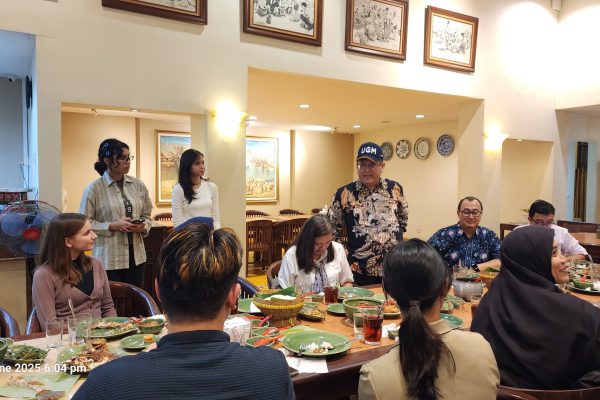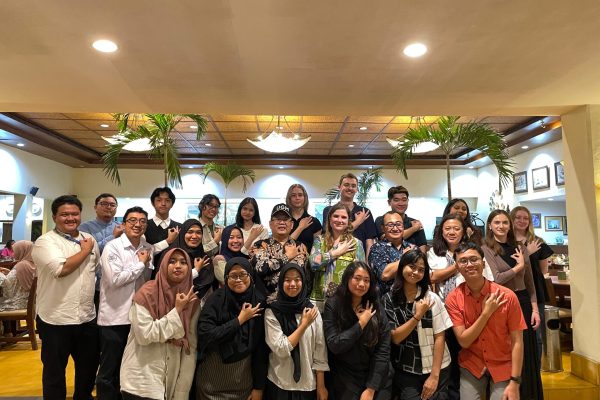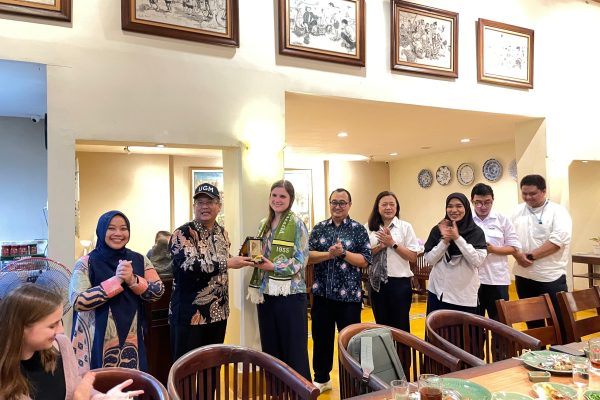Yogyakarta, June 30, 2025
The Faculty of Biology, Universitas Gadjah Mada (UGM), officially launched the International Summer Course on Sustainable Fisheries and Marine Biodiversity Conservation through a warm and welcoming courtesy dinner held on Monday, June 30, 2025, at Ikan Bakar Cianjur (IBC) Restaurant, Palagan, Yogyakarta. This event marked a significant occasion in welcoming seven students from the University of Technology Sydney (UTS), who will participate in a 26-day program filled with academic and cultural activities in and around Yogyakarta. This program is sponsored by the New Colombo Plan.
The opening ceremony was attended by leaders from both UGM and UTS, including Prof. Dr. Budi Setiadi Daryono, M.Agr.Sc., Dean of the Faculty of Biology UGM; Dr. Eko Agus Suyono, M.App.Sc., Vice Dean for Research, Community Service, Collaboration, and Alumni Affairs; Dr. Tyas Ikhsan Hikmawan, Head of the Office of International Affairs (OIA) UGM; and Dr. Nur Indah Septriani, S.Si., M.Sc., Ph.D., Head of the OIA of the Faculty of Biology UGM. Representing UTS was Dr. Megan Murray, accompanying academic staff of the summer course. Also present were Dr. Wulan Rahmiati, M.Hum., Program Coordinator of INCULS UGM; Destina Kawanti, S.Si., M.IP., Head of Partnership and KKN Program Task Force at the Directorate of Community Service (DPkM) UGM. The event was also attended by student liaison officers (LOs) and organizing committee members from the Faculty of Biology, UGM, who will accompany the international guests throughout their stay.
In his opening remarks, Dr. Eko Agus Suyono emphasized that this program reflects UGM’s strong commitment to promoting international collaboration that addresses sustainability issues, particularly in the areas of fisheries and marine biodiversity conservation. He also highlighted the importance of cross-cultural engagement and active student participation in community-based activities, in line with UGM’s holistic approach to education.
Dr. Wulan Rahmiati added that beyond academic content, the participants will receive contextual learning through Indonesian language classes and cultural immersion facilitated by INCULS. This language training serves as an important gateway to fostering meaningful interaction between participants and the local community.
Dr. Megan Murray expressed her sincere appreciation for the warm welcome extended by UGM. She conveyed that the UTS students are enthusiastic not only to learn academically but also to immerse themselves in the rich social, cultural, and natural landscapes of Indonesia, particularly its renowned biodiversity.
Closing the ceremony, Prof. Dr. Budi Setiadi Daryono expressed his hope that the program would serve as a platform for knowledge exchange, the strengthening of international networks, and the cultivation of cross-national awareness regarding environmental issues—especially those concerning marine and coastal ecosystems. He further emphasized the crucial role of youth in building a sustainable future through education, research, and community engagement.
Over the next month, participants will take part in various activities including Indonesian language classes at INCULS, community service projects in collaboration with UGM’s KKN program, online lectures by academic experts from institutions such as Universitas Gadjah Mada, University of Technology Sydney, Universiti Tun Hussein Onn Malaysia, Universiti Tunku Abdul Rahman, Chiba University, University of Leiden, University of the Philippines Los Baños, Universiti Malaysia Sabah, Universitas Hasanuddin, etc.The program also features field excursions to Porok Beach, permaculture training at Bumi Langit, visits to the Biology Museum, and cultural explorations to significant historical sites such as Prambanan Temple, Sojiwan Temple, Sonobudoyo Museum, the Yogyakarta Palace, Kotagede, the Royal Cemetery in Imogiri, etc.
The evening concluded on a warm and friendly note, symbolizing the beginning of a vibrant journey of cross-cultural and interdisciplinary learning that promises to enrich the academic and personal experiences of all participants.
This program also contributes significantly to the achievement of the United Nations Sustainable Development Goals (SDGs), particularly SDG 4 (Quality Education) through cross-cultural learning and global student capacity-building; SDG 14 (Life Below Water) by fostering understanding and conservation of marine biodiversity; SDG 17 (Partnerships for the Goals) through international collaboration between UGM and UTS; and SDGs 11 (Sustainable Cities and Communities) and 13 (Climate Action) through community service, permaculture field visits, and efforts to raise awareness on sustainable natural resource management. [Nur Indah Septriani]






